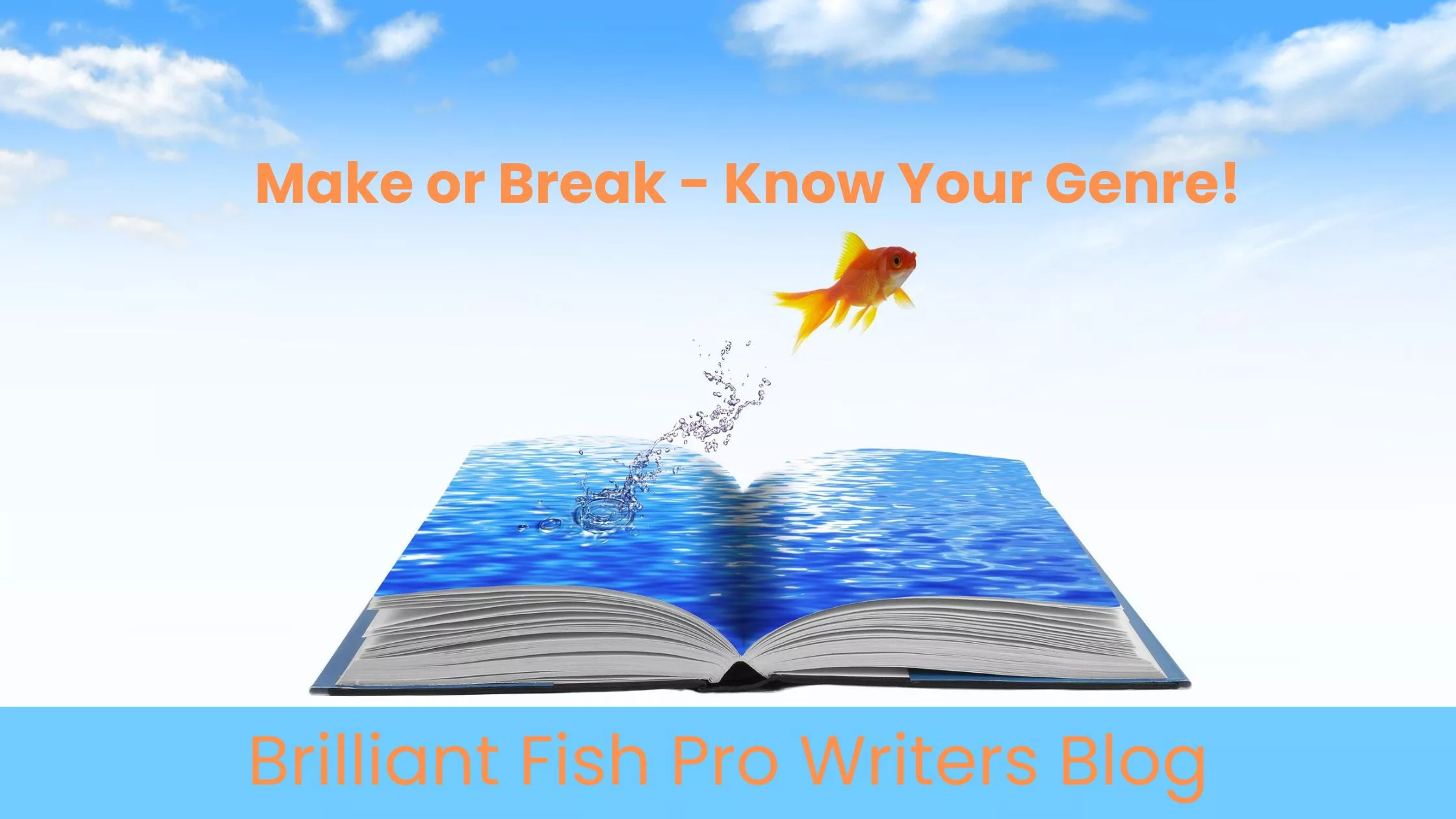Make or Break - Know Your Genre!
Most authors know what genre their newly-written book falls into but what does surprise me is how many I hear about who don’t really know what other publications are out there in the same genre, let alone have read any. If you are pitching to an agent or publisher, they will expect you have a clear idea of what other books you would consider to be similar and why.
The genre is your book’s identity. It’s how readers (and retailers) figure out what to expect. If someone picks up your book thinking it’s a cosy romance but it turns out to be a dark psychological thriller, they’re going to be disappointed and probably leave a review you’d rather not read. This emphasises the important of the cover – but that’s another blog! Read more here: https://brilliantfish.co.uk/blog/2024/08/why-people-do-judge-a-book-by-its-cover/
Your genre affects everything: the tone of your writing, your cover design, your keywords on Amazon, how you pitch it to your local bookshop to stock and even the way you market yourself. Without a clear genre, your book risks getting lost in the shuffle.
Who Are You Writing For?
Once you know your genre, you can figure out who your ideal reader is. Are they fans of fast-paced crime novels? Do they love magical fantasy worlds? Or maybe they’re looking for a heartwarming feel-good read after a long day at work?
Knowing your audience means you can speak directly to them—on your book cover, in your blurb, and in your social media posts. If you try to write for everyone, you’ll end up connecting with no one.
Check Out The Competition
Here’s a step too many self-published authors skip: checking out other writers in your genre. Grab a coffee, open Amazon, and look at the top-selling books in your category. It’s not cheating – it makes absolute sense to see what you are up against. That will then help you define what makes your book stand out.
Pay attention to:
Covers: What colours, fonts, and images are popular? Look at the bestsellers and I guarantee you will see a theme – and there’s a good reason for that. They sell books!
Blurbs: How do they hook readers? Take their lead and compare them to yours. Does yours stand up?
Reviews: What do readers love—and what do they hate? Can you see any similarities with how people may perceive your story?
This research helps you avoid common pitfalls and see where your book fits in. It also shows you what readers expect so you can deliver on that promise—while still putting your own spin on things.
Here are some of the main genre categories which I hope are helpful:
Fiction Genres
Romance – Contemporary Romance, Historical Romance, Romantic Comedy
Fantasy – Epic Fantasy, Urban Fantasy, Dark Fantasy
Science Fiction – Space Opera, Dystopian, Cyberpunk
Mystery – Cozy Mystery, Police Procedural, Hard-Boiled Detective
Thriller & Suspense – Psychological Thriller, Crime Thriller, Action Thriller
Horror – Supernatural Horror, Gothic Horror, Paranormal
Historical Fiction – Based on real historical settings or events
Young Adult (YA) – YA Romance, YA Fantasy, YA Dystopian
Middle Grade – Books for ages 8–12, often adventure or fantasy
Literary Fiction – Character-driven, focuses on themes and style
Women’s Fiction – Emotional journeys, relationships, and personal growth
Non-Fiction Genres
Memoir & Biography – Life stories, celebrity memoirs, historical figures
Self-Help & Personal Development – Motivation, habits, mental health
Business & Finance – Entrepreneurship, investing, leadership
Health & Wellness – Fitness, nutrition, mindfulness
Cookbooks & Food Writing – Recipes, culinary essays
Travel Writing – Guides, travel memoirs, adventure stories
True Crime – Real-life criminal cases and investigations
History – Historical events, cultural studies
Science & Technology – Popular science, tech trends
Parenting & Family – Advice, stories, educational approaches
Hybrid & Popular Cross-Genres
Romantic Suspense – Romance mixed with mystery or thriller elements
Historical Romance – Love stories set in the past
Paranormal Romance – Romance with supernatural elements
Fantasy Romance – Love stories in magical worlds
Science Fantasy – Combines futuristic tech with magic
Horror-Thriller – Fast-paced horror with suspense elements
Interestingly, here are the Top 15 Best-Selling Self-Publishing Genres:
- Romance – especially Contemporary, Romantic Suspense, and Paranormal Romance
- Thriller & Suspense – including Crime Thrillers and Psychological Thrillers
- Fantasy – particularly Epic Fantasy and Urban Fantasy
- Science Fiction – Dystopian, Space Opera, and Post-Apocalyptic are strong performers
- Young Adult (YA) – fantasy, romance, and dystopian themes do really well
- Mystery – Cozy Mysteries are huge for indie authors
- Paranormal & Supernatural – vampires, witches, shifters, etc.
- Horror – particularly Psychological and Supernatural Horror
- Women’s Fiction – emotional stories, relationships, and family themes
- Historical Romance – a steady favourite for romance readers
- LitRPG & GameLit – popular with fantasy and sci-fi readers
- Erotica – particularly romantic erotica (must follow platform guidelines)
- Memoir & Personal Stories – especially niche or inspirational journeys
- Self-Help & Personal Development – mindset, habits, and productivity books
- Health, Fitness & Wellness – including diet books and holistic living
Writing your book was the creative part.
Publishing it is the business part.
And like any business, you need to know your market.
✅ Define your genre.
✅ Know your reader.
✅ Study your competition.
Do these things, and you’ll give your book the best possible chance to shine in a crowded marketplace.
If you are looking for support on your writing journey, whatever the stage, I’m here to help. Call me on 07702 808137 or email liz@brilliantfish.co.uk
